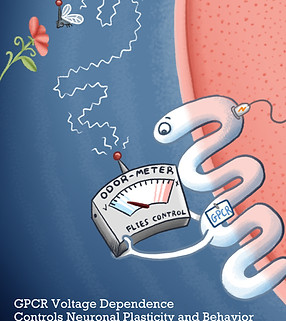
The Lab for Neural Circuits and Olfactory Perception
One of the major goals of neuroscience research is to understand how neural circuits encode information and support behavior, learning and memory. To answer this question requires us to relate neural activity to perception. Using the olfactory system of the fruit fly, Drosophila melanogaster, and a multidisciplinary approach which includes in vivo electrophysiology and functional imaging, optogenetics, thermogenetics and behavior experiments, we probe neural activity and neuronal codes underlying olfaction, manipulate them at the molecular, cellular, and network levels, and examine the effects these manipulations have on behavior.

Research


Current research at the lab revolves around the following topics:
-
The physiological roles of GPCR voltage dependence: 20 years ago GPCRs were found to be voltage dependent. However, how GPCR voltage dependence affects their physiological roles and in particular learning and memory was never demonstrated.
We examine how the voltage dependence of muscarinic, dopaminergic, GABAergic, and serotonergic GPCRs affect their role in learning and memory.
-
Mechanism underlying specific and accurate learning and memory: Associative learning is one of the major mechanisms by which animals learn about their environment. Despite years of research on the topic, the mechanisms underlying both specific learning and efficient learning are not fully understood.
-
GPCR voltage dependence as a therapeutic approach: ∼40% of all presently marketed drugs target GPCRs. Nevertheless, current methods of drug screening do not address the voltage dependency of GPCRs and thus miss potential drugs. We are developing a novel method for drug screening which directly examines the effects of drugs on the voltage dependence of GPCRs.
-
Neuronal code reliability in a plastic environment: A key requirement for repeated identification of stimuli is reliable representation by the neural code on each encounter. Despite many decades of intense research on synapses, it remains unclear how the plastic features of synaptic transmission can maintain reliable neural coding.




